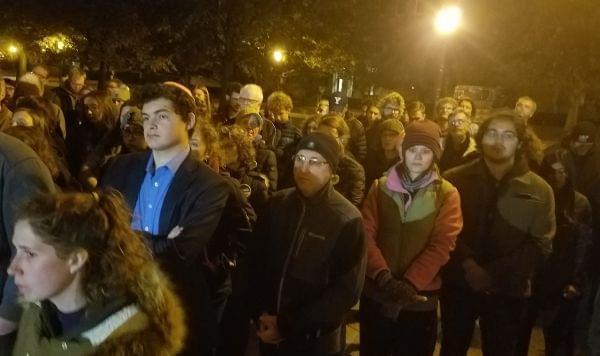U of I Community Mourns Pittsburgh Synagogue Shooting Victims At Vigil

A portion of the 200 or more people gathered on the University of Illinois Main Quad Sunday night for a vigil in memory of the shooting victims at Tree of Life Synagogue in Pittsburgh. Jim Meadows/Illinois Public Media
An estimated 200 people turned out at the University of Illinois Main Quad Sunday evening for a vigil in memory of the 11 people murdered, allegedly by a gunman shouting anti-Semitic rhetoric at the Tree of Life Synagogue in Pittsburgh.
The vigil was organized by Jewish students on the Urbana campus. While billed as a candlelight vigil, few candles stayed lit in the stiff wind. But those who gathered on the Anniversary Plaza on the south side of the Illini Union endured the weather to listen and mourn with university officials, and speakers from the Urbana campus’ Jewish community.
Chancellor Robert Jones told the gathering he shared in the anger and horror that they felt, knowing that a synagogue could be a target of such violence. The chancellor added that it brought him even greater sadness to know such violence could have happened in Champaign-Urbana.
“Tonight, our thoughts and prayers must be with Tree Of Life,” said Jones. “But I hope that tomorrow, our focus as a community will be on ending this cycle of hatred, intolerance, anti-Semitism and violence that diminish us all.”
Campus Provost Andreas Cangellaris opened his remarks by stating, “This could have happened here”. But he called on those at the vigil to not let themselves be consumed by despair and fear.
“Remember that loving the stranger is perhaps the best answer we have to hatred,” said Cangellaris.
U of I Police Chief Craig Stone told the vigil participants that his department would remain vigilant to keep the campus safe from violence. His remarks might have been a response to several speakers at the Sunday night vigil, who said they have seen a rise in anti-Semitic incidents in general, including on the U of I Urbana campus.
U of I senior Hayley Nagelberg told the gathering of going to Champaign’s Sinai Temple earlier that day to teach Hebrew and religion classes, and having to explain to her young students why there were police stationed outside the building. And, in remarks that seemed aimed at a specific but unnamed university official, Nagelberg accused the administration of inaction in the face of anti-Semitic incidents that had occurred on the campus over the past two years.
“When the words ‘I hate Jews’ were found carved in the bathroom door on campus, nothing was done,” said Nagelberg. “When the words, ‘No room for Zionists at UIUC’ were shared online, all that came was a statement. When an Israeli flag was burned by a campus leader, you told me it didn’t happen here. And when I showed you that it did happen here, you told me there is a point where these acts cannot stand, but still nothing has been done.”
Rabbi Dovid Tiechtel of the Illini Chabad Center For Jewish Life in Champaign told the gathering that strength would come from uniting together in love. After the vigil, Tiechtel explained that while he has also seen an increase in anti-Semitic incidents, he’s been heartened by another increase, in the number of people who push back against such attacks.
“I hear from my grandparents,” said Tiechtel, who describes himself as a first-generation American. “I’d always ask them, how did things happen when they were children, during the Holocaust? And they said that, no one spoke up. I think today, the good news is people ARE speaking up. And we must respond, both here in our campus, in our city and across the world. We have to respond to hate, because we can’t always say it’s someone else’s hate, because it could end up being in our own backyard.”
Max Shapiro, one of the organizers of the vigil, said he has also noticed an uptick in anti-Semitic incidents, and a responding heightening of security.. He said he saw an armed guard stationed at the Chabad center in Washington D.C. during a recent visit.
“It could happen anywhere,” said Shapiro. “It happened in Pittsburgh, it could happen here. And I think we need to take more precautions as well.”
At one point in the vigil, Rabbi Schlomo Schachter, with the campus unit of the Orthodox Union’s Jewish Learning Initiative on Campus (OW-JLIC), recited the Mourner’s Kaddish, with several members of the gathering joining in. While the prayer, written in Aramaic, is traditionally recited for a prescribed period of time following a death, it does not actually mention death, but is focused on praising God.

